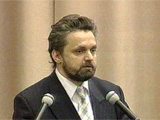|
|
TODAY.AZ / Business
Russia central banker dies after attack
14 September 2006 [16:38] - TODAY.AZ

Andrei Kozlov, 41, a high-profile figure in Russian finance who was in charge of cleaning up the murky and fragmented banking system, had undergone emergency surgery for wounds to the body and head after the Wednesday night attack in which his driver was killed.
"Andrei Kozlov died early this morning," Inna Sigeyeva, a deputy chief doctor at Moscow's Hospital No. 33, told Reuters.
Sources close to police investigations said the attack on Kozlov, who led an aggressive drive to shut down banks accused of money laundering and other crimes, bore the hallmarks of an attempted contract killing.
The attack could have an impact on banking stocks such as Sberbank and on the interbank market, especially if the Kremlin reacts by cracking down on banks Kozlov investigated, analysts said.
The gunmen were lying in wait for Kozlov as he emerged from the stadium in the Sokolniki district in the northeast of the Russian capital after a soccer match between bank employees.
Russian news reports said the gunmen fired at least four times, killing the driver Alexander Semyonov on the spot and badly wounding Kozlov before fleeing.
In a car park outside the stadium, a pool of blood could be seen next to a dark blue Mercedes car. Nearby lay a body draped in plastic sheeting.
Russia's banking system grew out of chaos after the collapse of the Soviet Union when violence was a part of doing business. One analyst said the attack showed the sector had still not shaken off its past.
Contract-style killings of wealthy businessmen and bankers were common in the 1990s but they tapered off after President Vladimir Putin came to power in 2000.
Kozlov's shooting was the highest profile attack in the capital since Anatoly Chubais, chief executive of Russia's electricity monopoly, escaped unscathed from an assassination attempt on his motorcade in March 2005.
"We are looking at all possible versions, including (Kozlov's) professional activities, mistaken identity, and his personal relations," Moscow's chief prosecutor Yuri Syomin was quoted as saying by Interfax.
Only last week, Kozlov called at a banking forum in the southern city of Sochi for tougher penalties against bankers found guilty of money laundering.
Russia has about 1,200 banks, many of them tiny outfits with little capital.
"This event forces us to acknowledge what the central bank has been up against from a community which has its roots in the wild early years of transition," said Rory MacFarquhar, an economist at Goldman Sachs in Moscow.
Kozlov started at what was then the Soviet central bank at the age of 24. He rose quickly through the ranks to become first deputy chairman in 1997. He left two years later for a spell in the private sector, rejoining the central bank in April 2002.
/Reuters/
URL: http://www.today.az/news/business/30177.html
 Print version
Print version
Connect with us. Get latest news and updates.
See Also
- 23 January 2026 [10:42]
S&P Global Ratings Sees Azerbaijan’s Banks Remaining Resilient in 2026 - 23 January 2026 [10:00]
Baku brings together regional leaders for clean energy transition discussions - 22 January 2026 [12:22]
Azerbaijan–US trade in 2025 falls from 2024 but remains above earlier years - 22 January 2026 [11:38]
SOCAR acquires 10% stake in Eni’s Baleine oil and gas project offshore Côte d’Ivoire - 22 January 2026 [10:42]
Foreign investment in Azerbaijan rises sharply with UK and UAE leading - 22 January 2026 [10:21]
Washington and Baku deepen economic ties with new business mission - 21 January 2026 [03:12]
Azerbaijan targets 8 gigawatts of solar and wind power by 2032, President says - 20 January 2026 [14:08]
Armenia explores new route for Russian gas imports via Azerbaijan amid Iran, Lars border challenges - 15 January 2026 [13:22]
China’s CNCEC, Azerbaijan’s SOCAR strengthen energy partnership - 14 January 2026 [19:22]
bp introduces innovative drilling fluid recycling in Azerbaijan, Georgia, and Türkiye
Most Popular
 South Caucasus - from era of war to era of peace
South Caucasus - from era of war to era of peace
 President Ilham Aliyev meets with Prime Minister of Czech Republic in Davos
President Ilham Aliyev meets with Prime Minister of Czech Republic in Davos
 President Ilham Aliyev meets with his Israeli counterpart in Davos
President Ilham Aliyev meets with his Israeli counterpart in Davos
 President Ilham Aliyev meets with President of Brookfield Asset Management in Davos
President Ilham Aliyev meets with President of Brookfield Asset Management in Davos
 A correspondence that says more than it seems
A correspondence that says more than it seems
 President Ilham Aliyev meets with President of Dell Technologies in Europe, Middle East, and Africa in Davos
President Ilham Aliyev meets with President of Dell Technologies in Europe, Middle East, and Africa in Davos
 President Donald Trump sends letter to President Ilham Aliyev
President Donald Trump sends letter to President Ilham Aliyev
